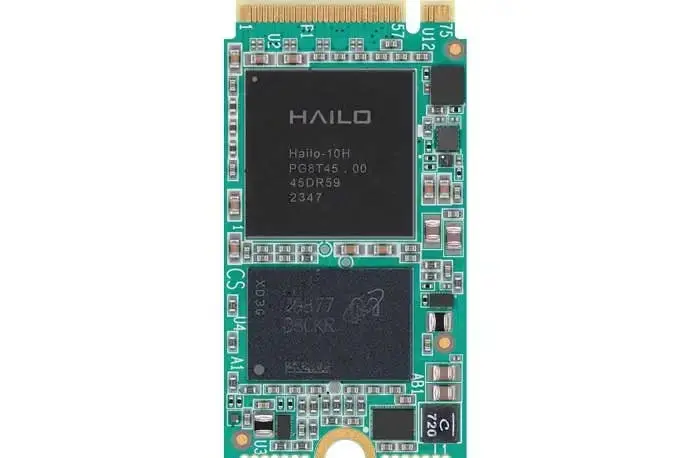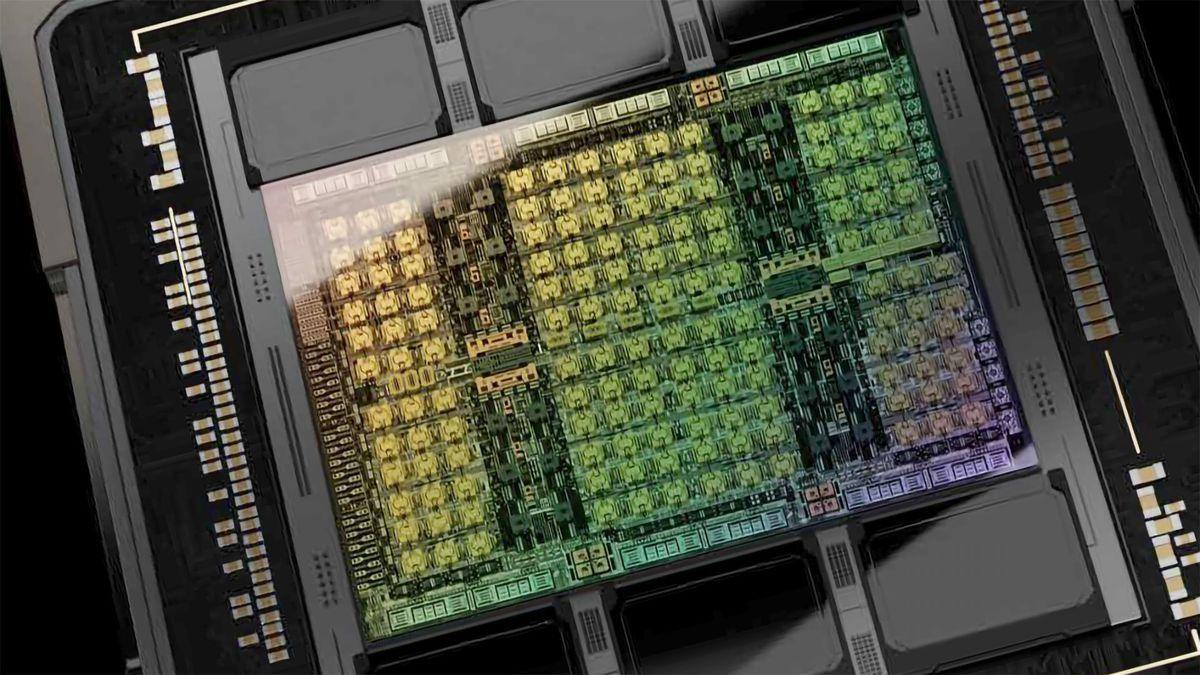Hailo Unveils Hailo-10H: A Groundbreaking Generative AI Chip for Edge Devices
2 Sources
2 Sources
[1]
Hailo launches Hailo-10H chip with support for generative AI at the edge - SiliconANGLE
Hailo launches Hailo-10H chip with support for generative AI at the edge Artificial intelligence chip startup Hailo Technologies Ltd. today announced the commercial release of the Hailo-10H, its second-generation AI accelerator featuring powerful generative AI capabilities. The Hailo-10H introduces new on-device capabilities that include large language models, vision-language models and other generative architectures without relying on cloud connectivity. The new AI chip builds on the success of the company's previous Hailo-8 processor that was focused on vision AI tasks. The new chip adds support for generative AI while retaining the same power-efficient design optimized for edge environments. The Hailo-10H has a typical power draw of just 2.5 watts and allows for sophisticated AI applications in products ranging from personal devices and smart home systems to automotive and telecom infrastructure. "With the Hailo-10H now available for order, we're taking another major step toward our mission of making AI accessible to all," said Orr Danon, chief executive officer and co-founder of Hailo. "This is the first discrete AI processor to bring real generative AI performance to the edge, combining high efficiency, cost-effectiveness and a robust software ecosystem." The Hailo-10H is fully compatible with Hailo's existing software stack and benefits from the support of a global developer community that has more than 10,000 users each month. The chip allows developers to run state-of-the-art vision and generative AI models directly on edge devices, delivering real-time responsiveness with ultra-low latency. It also allows for real-time deployment of AI models with ultra-low latency, achieving first-token generation in under a second and processing more than 10 tokens per second on 2B parameter models. In video use cases, it delivers state-of-the-art performance with 4K object detection using models like YOLOv11m. By enabling local processing, according to Hailo, the chip improves data privacy and reduce dependency on cloud-based AI services, which also helps cut operational costs. It's automotive-qualified to AEC-Q100 Grade 2 standards and is targeted for 2026 production in automotive systems such as cockpit displays and driver monitoring units. Halio is a venture capital-backed startup that has raised $564 million over nine rounds, including $136 million in October 2021. Investors in the company include SKC Co. Ltd., 5AM Ventures LP, Versant Ventures LP, GPB Capital Holdings, Reedland Capital Partners and Mitsubishi UFJ Capital Co. Ltd.
[2]
Nvidia Rival Hailo Launches GenAI Chip For Edge Devices
Among the companies adopting the Hailo-10H is HP Inc., which is using the chip as the basis for the HP AI Accelerator M.2 Card that can integrate "seamlessly" with HP point-point sale services as well as HP workstations and commercial PCs. Nvidia rival Hailo on Tuesday announced the general availability of its second-generation AI accelerator chip, saying that the product is the first of its kind to "bring real generative AI performance to the edge" while consuming very little energy. Hailo, an Israel-based AI chip startup, said the Hailo-10H chip is capable of 40 trillion operations per second (TOPS) of 4-bit integer (INT4) performance and 20 TOPS of 8-bit integer (INT8) performance using 2.5 watts. By contrast, Nvidia's Jetson Orin Nano chips can hit up to 67 TOPS of INT8, which is double the size of INT4, but has a power range of 7-25 watts. [Related: 7 New, Cutting-Edge AI Chips From Nvidia And Rivals In 2025] Designed for edge devices across consumer, enterprise and automotive markets, the Hailo-10H combines "high efficiency, cost-effectiveness and a robust software ecosystem," which is backed by its "mature and widely adopted software stack" that's used by more than 10,000 monthly users, according to the startup. Among the companies adopting the Hailo-10H is HP Inc., which is using the chip as the basis for the HP AI Accelerator M.2 Card that can integrate "seamlessly" with HP point-point sale services as well as HP workstations and commercial PCs. The startup said the Hailo-10H can enable advanced use cases like natural language human-machine interaction, visual awareness and multi-modal AI to run seamlessly within the power and cost constraints typical of edge environments." In performance benchmarks conducted by Hailo, the chip was shown to achieve a "first-token latency of under 1 second and over 10 tokens per second" on various 2-billion-parameter language and vision-language models, according to the startup. Hailo, which is among several AI chip startups challenging Nvidia, works with a wide range of partners, from OEMs such as HP, Dell and Advantech to distributors like J-Squared Technologies and Kaga Fei America, among others. Founded in 2017, the startup has raised more than $340 million from investors, which includes $120 million for a Series C extension round it announced last year.
Share
Share
Copy Link
Hailo Technologies Ltd. has launched the Hailo-10H, a second-generation AI accelerator chip that brings generative AI capabilities to edge devices with high efficiency and low power consumption.
Hailo Introduces Groundbreaking Generative AI Chip for Edge Devices
Hailo Technologies Ltd., an Israel-based AI chip startup, has announced the commercial release of its second-generation AI accelerator, the Hailo-10H. This new chip marks a significant advancement in edge AI technology, bringing powerful generative AI capabilities to edge devices without relying on cloud connectivity
1
.
Source: CRN
Technical Specifications and Performance
The Hailo-10H boasts impressive specifications, delivering 40 trillion operations per second (TOPS) of 4-bit integer (INT4) performance and 20 TOPS of 8-bit integer (INT8) performance while consuming only 2.5 watts of power
2
. This level of efficiency positions the Hailo-10H as a formidable competitor in the AI chip market, particularly when compared to offerings from industry giants like Nvidia.In benchmark tests, the chip demonstrated remarkable capabilities, achieving a first-token latency of under 1 second and processing over 10 tokens per second on 2-billion-parameter language and vision-language models
2
. For video applications, it delivers state-of-the-art performance with 4K object detection using models like YOLOv11m1
.Applications and Use Cases
The Hailo-10H is designed to support a wide range of AI applications across various sectors:
- Personal devices and smart home systems
- Automotive applications (qualified to AEC-Q100 Grade 2 standards)
- Telecom infrastructure
- Enterprise solutions
The chip enables advanced use cases such as natural language human-machine interaction, visual awareness, and multi-modal AI within the power and cost constraints typical of edge environments
2
.Industry Adoption and Partnerships
HP Inc. has already adopted the Hailo-10H for its AI Accelerator M.2 Card, which can integrate seamlessly with HP point-of-sale services, workstations, and commercial PCs
2
. This early adoption by a major tech company signals strong potential for the Hailo-10H in the market.Hailo works with a diverse range of partners, including OEMs like Dell and Advantech, as well as distributors such as J-Squared Technologies and Kaga Fei America
2
.Related Stories
Company Background and Funding

Source: SiliconANGLE
Founded in 2017, Hailo has quickly established itself as a notable player in the AI chip industry. The company has raised significant funding, with reports varying between $340 million
2
and $564 million1
across multiple rounds. Key investors include SKC Co. Ltd., 5AM Ventures LP, Versant Ventures LP, and Mitsubishi UFJ Capital Co. Ltd1
.Market Impact and Future Outlook
The release of the Hailo-10H represents a significant step in Hailo's mission to make AI accessible to all, as stated by CEO and co-founder Orr Danon
1
. By enabling local processing, the chip not only improves data privacy but also reduces dependency on cloud-based AI services, potentially cutting operational costs for businesses implementing edge AI solutions.As the first discrete AI processor to bring real generative AI performance to the edge, the Hailo-10H could potentially disrupt the market, challenging established players like Nvidia. With its combination of high efficiency, cost-effectiveness, and robust software ecosystem, Hailo is well-positioned to capitalize on the growing demand for edge AI solutions across various industries.
References
Summarized by
Navi
[1]
Related Stories
Intel Challenges AI Cloud Market with Gaudi 3-Powered Tiber AI Cloud and Inflection AI Partnership
08 Oct 2024•Technology

Huawei's Ascend 910D AI Chip Challenges NVIDIA Amid US Export Restrictions
21 Apr 2025•Technology

Taalas Raises $169 Million to Build Custom AI Chips That Challenge Nvidia's Dominance
Yesterday•Technology

Recent Highlights
1
ByteDance's Seedance 2.0 AI video generator triggers copyright infringement battle with Hollywood
Policy and Regulation

2
Demis Hassabis predicts AGI in 5-8 years, sees new golden era transforming medicine and science
Technology

3
Nvidia and Meta forge massive chip deal as computing power demands reshape AI infrastructure
Technology





